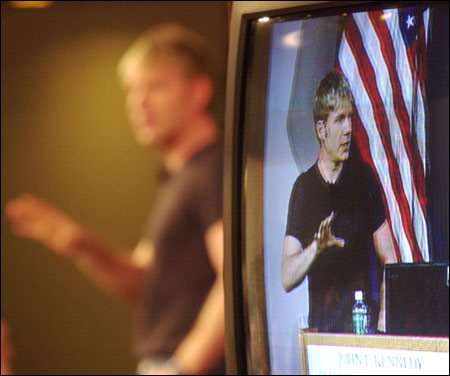Traditional ecological wisdom questioned:
Danish writer challenges notion of ‘imminent destruction’

Controversial Danish writer Bjorn Lomborg was challenged by a U.S. environmental leader in a spirited debate over the global environment held in the Kennedy School’s Forum Thursday night (March 13). Lomborg, whose book “The Skeptical Environmentalist” has been condemned by some in the scientific community, argued that the world is “not faced with imminent deterioration [environmentally]. We can stop acting in desperation.”
“Things have been getting better,” he said in his opening 10-minute statement. “We have more leisure time, greater security, fewer accidents, more education, more amenities, higher incomes, fewer starving, more food, and a healthier and longer life.” Lomborg argued that this applies to both the developed and the developing world.
Lomborg said it was important to remember how far things had come. Citing the terrible air pollution in London in 1585, the author said it peaked in 1890 and has now declined to below 1585 levels. Air is cleaner in London than it has been in a long time, he said. And he added that it does make sense to put expensive filters in diesel cars, but we should do so not because we are driven by fear, but because it is a good idea.

“We may have an inflated concern about the environment,” he said, adding that the focus should be on cost and efficiency. “We could give clean drinking water and sanitation for everyone on Earth for the cost of Kyoto Protocol [for Global Climate Change] for one year.” He added that its estimated cost of $150 billion to $350 billion a year for the rest of the century is three to seven times more than global development aid to the Third World. The Kyoto agreement, he claimed, would only slow down global warming by six years.
The Sierra Club’s Executive Director, Carl Pope, politely but firmly countered the claims in Lomborg’s book, calling them a “fiction and a confection,” adding that it could “encourage us to continue recklessly to damage our own life-support system.” Pope dismissed Lomborg’s assertion that prosperity is the answer to the world’s environmental problems. The real question, Pope said, is “Are we being good stewards of the biosphere?”
Pope cited examples of the Canadian and New England fisheries industries that have collapsed because of overfishing. He said that Lomborg claims in his book that fish farming is increasing faster than stocks can collapse. Pope said that apart from depleting the fish, it “doesn’t make up for the economic impact,” referring to the fact that New England and Nova Scotia face high unemployment in those industries. Pope noted that he didn’t think that is “good stewardship.”
Where things are getting better, Pope said,”they are not getting better because of prosperity but because of political will.” He added that 40 percent of the population of New Delhi suffers from asthma. Air pollution is going down, but not because people got richer; it changed because people got fed up. “It is going down because they changed the fuel mix in their three-wheelers.”
This event was co-sponsored by KSG Ecology and Environment PIC, Harvard College Environmental Action Committee (EAC), Harvard College Sierra Student Coalition, Working Interdisciplinary Students for the Environment (WISE), and the Institute of Politics.




